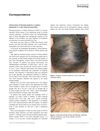 January 2017 in “Korean Journal of Pharmacognosy”
January 2017 in “Korean Journal of Pharmacognosy” Modified red ginseng extract promotes hair growth and has antioxidant and anti-inflammatory effects.
 17 citations,
January 1995 in “The American Journal of Medicine”
17 citations,
January 1995 in “The American Journal of Medicine” The document concludes that proper diagnosis and tailored long-term treatment can effectively manage androgenic disorders in women, improving patient care outcomes.
[object Object]  4 citations,
April 2014 in “Journal of Pharmacology and Pharmacotherapeutics”
4 citations,
April 2014 in “Journal of Pharmacology and Pharmacotherapeutics” The boy's hair loss was caused by the tuberculosis drug isoniazid but grew back after stopping the medication.
 October 2018 in “InTech eBooks”
October 2018 in “InTech eBooks” The most effective treatments for hair loss are minoxidil, finasteride, PRP, and hair transplants, with steroids and immunosuppressants for autoimmune types.
 7 citations,
June 2021 in “Trends in Food Science and Technology”
7 citations,
June 2021 in “Trends in Food Science and Technology” Western diet may cause male pattern baldness; low glycemic diet with magnesium could help.
 September 2004 in “PubMed”
September 2004 in “PubMed” Androgenetic alopecia, or hair loss, is influenced by hormones and genetics, and can be treated with medications like minoxidil, finasteride, or hormone therapy, with effectiveness evaluated after 6 months.
 83 citations,
April 1992 in “Clinical Endocrinology”
83 citations,
April 1992 in “Clinical Endocrinology” Having enough iron improves the effectiveness of a specific hair loss treatment in women.
 47 citations,
October 2014 in “Expert Opinion on Emerging Drugs”
47 citations,
October 2014 in “Expert Opinion on Emerging Drugs” New alopecia treatments aim for better results and fewer side effects.
9 citations,
June 2022 in “Plants” Shallot extract may help with hair growth and treating hair loss.
 7 citations,
May 1978 in “International Journal of Dermatology”
7 citations,
May 1978 in “International Journal of Dermatology” Recent hair loss research shows some progress, especially in understanding male pattern baldness, but effective treatments for many types of hair loss are still lacking.
 5 citations,
May 2020 in “Clinical and Experimental Dermatology”
5 citations,
May 2020 in “Clinical and Experimental Dermatology” Clascoterone may be a promising treatment for hair loss.
 January 2025 in “Journal of Medicinal Food”
January 2025 in “Journal of Medicinal Food” Soybean extract may help hair growth in testosterone-related hair loss.
 December 2024 in “Anti-Aging Eastern Europe”
December 2024 in “Anti-Aging Eastern Europe” PRP is effective for skin rejuvenation, hair restoration, and acne scar treatment.

Hair RiseTM microemulsion effectively promotes hair growth and treats hair loss better than standard treatments.
 December 2023 in “European Journal of Medicinal Chemistry”
December 2023 in “European Journal of Medicinal Chemistry” Natural products might be safe, effective, and affordable treatments for hair loss.
[object Object]  September 2023 in “JEADV Clinical Practice”
September 2023 in “JEADV Clinical Practice” People with common hair loss conditions may have a higher risk of heart disease and related health issues.
 August 2023 in “Medicina-lithuania”
August 2023 in “Medicina-lithuania” Abusing steroids can damage your heart, muscles, reproductive system, liver, skin, and brain, and may increase the risk of Alzheimer's disease.
 August 2023 in “Theoretical and Natural Science”
August 2023 in “Theoretical and Natural Science” Fat stem cells help rejuvenate skin, reduce wrinkles, lighten skin, and promote hair growth.
 November 2020 in “Journal of The American Academy of Dermatology”
November 2020 in “Journal of The American Academy of Dermatology” Men with male pattern baldness may be more at risk for severe COVID-19, and anti-androgen treatments could offer protection.
 January 2020 in “Egyptian Journal of Dermatology and Venereology”
January 2020 in “Egyptian Journal of Dermatology and Venereology” People with alopecia have shorter hair follicles and more c-kit, a stem cell factor receptor, which could predict how the condition progresses.
February 2021 in “International journal of regenerative medicine” A new method using fat tissue cells may help treat hair loss.
 205 citations,
March 2012 in “Science Translational Medicine”
205 citations,
March 2012 in “Science Translational Medicine” PGD2 stops hair growth and is higher in bald men with AGA.
 108 citations,
January 2003 in “Fertility and Sterility”
108 citations,
January 2003 in “Fertility and Sterility” Flutamide may slightly improve hair loss in women, but finasteride does not work.
 13 citations,
January 2018 in “International Journal of Dermatology”
13 citations,
January 2018 in “International Journal of Dermatology” The study found that treatment improved hair condition in patients with Fibrosing Alopecia in a Pattern Distribution in Chile.
 11 citations,
January 2015 in “Current problems in dermatology”
11 citations,
January 2015 in “Current problems in dermatology” The conclusion is that treatments like finasteride and minoxidil can prevent baldness progression and improve hair density, but more research is needed on other therapies.
 1 citations,
October 2022 in “International Journal of Molecular Sciences”
1 citations,
October 2022 in “International Journal of Molecular Sciences” Using healthy donor stem cells can potentially calm overactive immune cells and reduce inflammation in severe hair loss patients, offering a possible treatment method.
 1 citations,
May 2017 in “InTech eBooks”
1 citations,
May 2017 in “InTech eBooks” Some cosmetic procedures show promise for treating hair loss, but more research is needed to confirm their safety and effectiveness.
July 2024 in “International Journal of Molecular Sciences” RF-based therapies might help treat hair loss.
 December 2023 in “Azerbaijan Pharmaceutical and Pharmacotherapy J”
December 2023 in “Azerbaijan Pharmaceutical and Pharmacotherapy J” The minoxidil gel could be a better treatment for hair loss than traditional forms.
 January 2023 in “Journal of Ravishankar University”
January 2023 in “Journal of Ravishankar University” Hair loss can be caused by stress, aging, and harmful substances that create an imbalance in the body's natural processes.



























